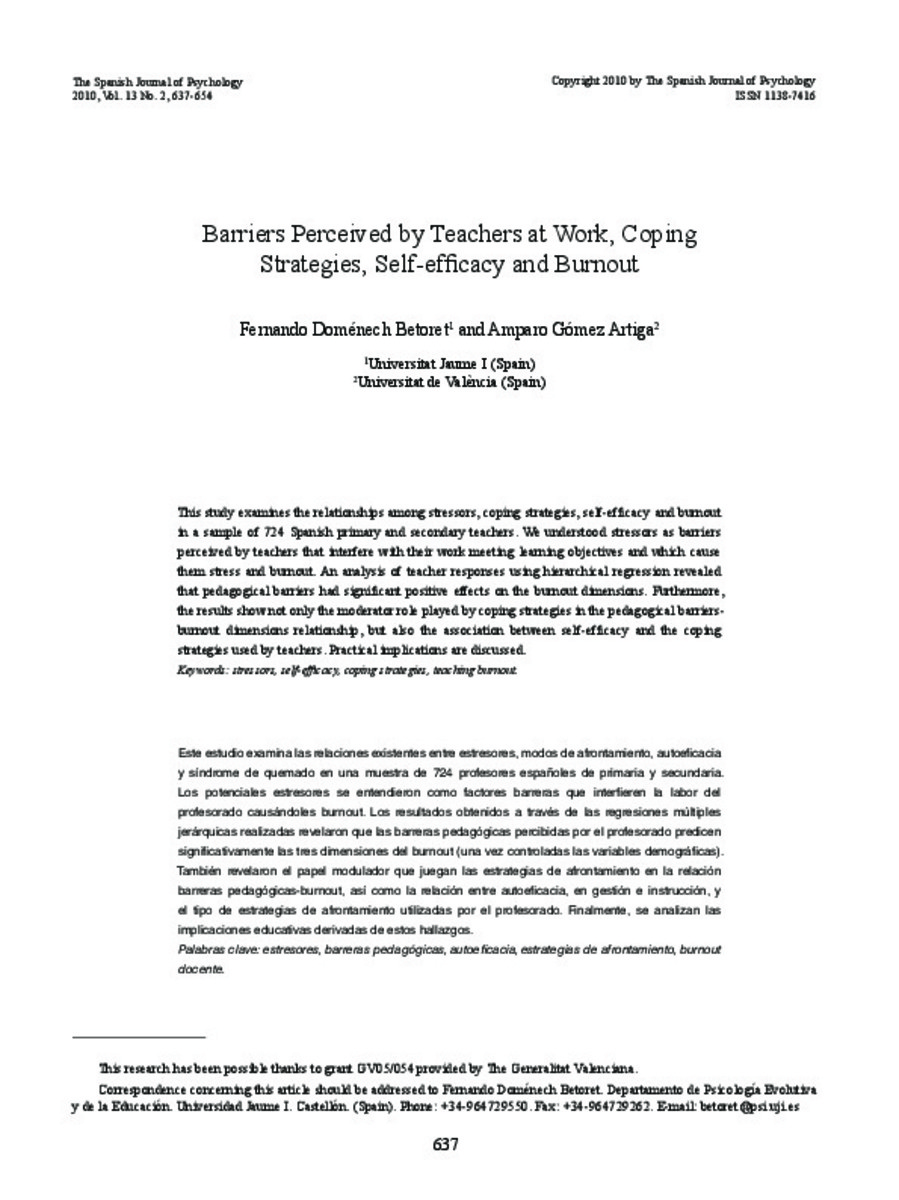Mostrar el registro sencillo del ítem
Barriers Perceived by Teachers at Work, Coping Strategies, Self-efficacy and Burnout
| dc.contributor.author | Doménech Betoret, Fernando | |
| dc.contributor.author | Gómez Artiga, Amparo | |
| dc.date.accessioned | 2014-03-20T16:58:09Z | |
| dc.date.available | 2014-03-20T16:58:09Z | |
| dc.date.issued | 2010-11 | |
| dc.identifier.issn | 1988-2904 | |
| dc.identifier.issn | 1138-7416 | |
| dc.identifier.uri | http://hdl.handle.net/10234/87970 | |
| dc.description.abstract | This study examines the relationships among stressors, coping strategies, self-efficacy and burnout in a sample of 724 Spanish primary and secondary teachers. We understood stressors as barriers perceived by teachers that interfere with their work meeting learning objectives and which cause them stress and burnout. An analysis of teacher responses using hierarchical regression revealed that pedagogical barriers had significant positive effects on the burnout dimensions. Furthermore, the results show not only the moderator role played by coping strategies in the pedagogical barriers- burnout dimensions relationship, but also the association between self-efficacy and the coping strategies used by teachers. Practical implications are discussed. | ca_CA |
| dc.description.abstract | Este estudio examina las relaciones existentes entre estresores, modos de afrontamiento, autoeficacia y síndrome de quemado en una muestra de 724 profesores españoles de primaria y secundaria. Los potenciales estresores se entendieron como factores barreras que interfieren la labor del profesorado causándoles burnout. Los resultados obtenidos a través de las regresiones múltiples jerárquicas realizadas revelaron que las barreras pedagógicas percibidas por el profesorado predicen significativamente las tres dimensiones del burnout (una vez controladas las variables demográficas). También revelaron el papel modulador que juegan las estrategias de afrontamiento en la relación barreras pedagógicas-burnout, así como la relación entre autoeficacia, en gestión e instrucción, y el tipo de estrategias de afrontamiento utilizadas por el profesorado. Finalmente, se analizan las implicaciones educativas derivadas de estos hallazgos. | ca_CA |
| dc.format.extent | 18 p. | ca_CA |
| dc.format.mimetype | application/pdf | ca_CA |
| dc.language.iso | eng | ca_CA |
| dc.publisher | Cambridge University Press | ca_CA |
| dc.relation.isPartOf | The Spanish Journal of Psychology, 13, 2, p. 637-654 | ca_CA |
| dc.rights | Copyright © Cambridge University Press 2010 | ca_CA |
| dc.rights.uri | http://rightsstatements.org/vocab/InC/1.0/ | * |
| dc.subject | stressors | ca_CA |
| dc.subject | self-efficacy | ca_CA |
| dc.subject | coping strategies | ca_CA |
| dc.subject | teaching burnout | ca_CA |
| dc.subject | estresores | ca_CA |
| dc.subject | barreras pedagógicas | ca_CA |
| dc.subject | autoeficacia | ca_CA |
| dc.subject | estrategias de afrontamiento | ca_CA |
| dc.subject | burnout docente | ca_CA |
| dc.title | Barriers Perceived by Teachers at Work, Coping Strategies, Self-efficacy and Burnout | ca_CA |
| dc.type | info:eu-repo/semantics/article | ca_CA |
| dc.identifier.doi | http://dx.doi.org/10.1017/S1138741600002316 | |
| dc.rights.accessRights | info:eu-repo/semantics/openAccess | ca_CA |
| dc.relation.publisherVersion | http://journals.cambridge.org/action/displayAbstract?fromPage=online&aid=8805796 | ca_CA |
| dc.type.version | info:eu-repo/semantics/publishedVersion | ca_CA |
Ficheros en el ítem
Este ítem aparece en la(s) siguiente(s) colección(ones)
-
PSI_Articles [589]
Articles de publicacions periòdiques







